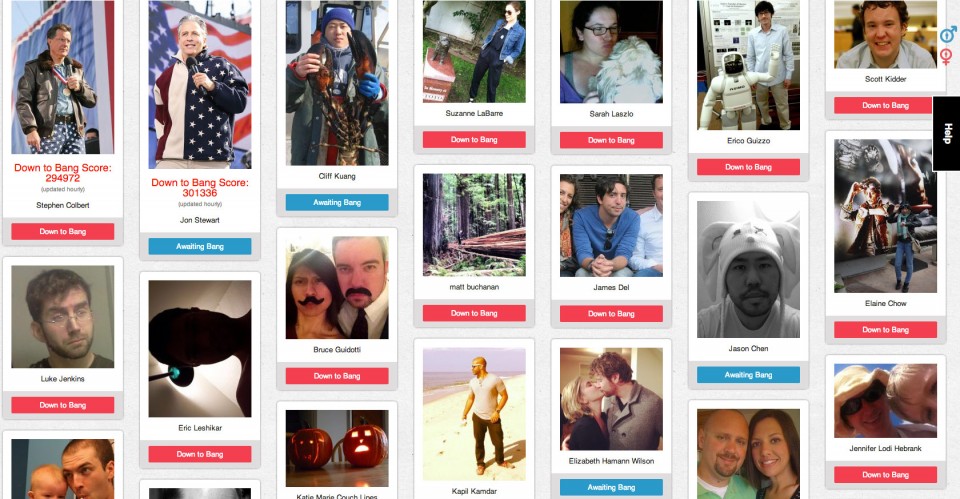Armchair Game Design Analysis of Bang w/ Friends

via http://www.fastcodesign.com/1671867/bang-with-friends-aims-to-become-facebooks-klout-for-banging
I heard recently about a new Facebook app called Bang With Friends that lets you secretly tag those of your contacts whom you’d like to ‘bang.’ If the friend also has the app and has tagged you as a potential bang-ee, you’ll both be notified, and can presumably hook up. Skeeziness of trying to sleep with your friends aside (speaking from experience, I don’t recommend it), the interactions Bang with Friends proposes are interesting, and warrant a further look at why I think the app will fail at its misguided/intended purpose.
On the surface, you could look at the choice options of BWF using a simple 2×2 matrix, like below:
| Friend | Wants to Bang | Doesn’t Want to/Indifferent | |
| You | |||
| Wants to Bang | Good* | Indifferent* | |
| Doesn’t Want to/Indifferent | Indifferent* | Indifferent* |
*For arguments sake these are only the primary outcomes, conformed to the subjective premise set forth in BWF. Obviously, sleeping with a friend could be very very bad, and not sleeping with them could be good in the sense that it doesn’t destroy a friendship.
Looks simple, right? If you both match up, you can bang; if not, nobody has to know and you can go about your business un-rejected. But there is a glaring oversight the designers of BWF have made, and that is failing to make a distinction between someone who actively wants to bang a friend, someone who is indifferent, and someone who actively doesn’t want to bang a friend.
Here’s a deeper analysis, keeping in mind that we have more than just the binary options and outcomes the BWF designers assume:
| options/outcomes from a single BWF user’s point of view (as though they were going through the list of friends evaluating bang-ability) |
|||
| User Attitude | Action | Worst Case Outcome (Friend Doesn’t Want/Indifferent) |
Best Case Outcome (Friend Wants to Bang) |
| Actively Wants to Bang Friend | Ask/Tell Directly | destabilize friendship | bang |
| Ask/Tell on BWF | maintain friendship | bang | |
| Do Nothing | repress feelings | maintain friendship | |
| Indifferent About Banging Friend | Ask/Tell Directly | destabilize friendship | bang |
| Ask/Tell on BWF | maintain friendship | bang | |
| Do Nothing | repress feelings | maintain friendship | |
| Actively Doesn’t Want to Bang Friend | Ask/Tell Directly | destabilize friendship | maintain friendship |
| Ask/Tell on BWF | destabilize friendship | maintain friendship | |
| Do Nothing | destabilize friendship | maintain friendship | |
I also took into account a situation where direct communication took place (ie, unobscured by an app). Notice again that there is no difference in outcomes for a user who actively wants to bang and a user who is indifferent. Listing it all out we have four plausible outcomes between any two BWF users:
- repress feelings
- destabilize friendship
- maintain friendship
- bang
I’ve ordered these outcome based on what I subjectively say is worst-to-best, again taking into account the BWF designers simplistic premise that banging=good. With that order in mind, let’s assign values to each outcome:
- repress feelings (-2 points; repressing your feelings is actively bad. You should express yourself even if it taxes a relationship, or prevents banging.)
- destabilize friendship (-1 point; destabilizing a friendship is actively bad, but not as bad as repressing your feelings.)
- maintain friendship (+1 point; this is an actively good thing. Maintaining relationships takes work.)
- bang (+2 points; again, taken from the premise of BWF that banging is actively good by default & consequences are not considered.)
Now we switch out the outcomes with numerical values, and we have a crude scoring system:
| options/outcomes from a single BWF user’s point of view
(as though they were going through the list of friends evaluating bang-ability) |
|||
| User Attitude | Action | Worst Case Outcome
(Friend Doesn’t Want/Indifferent) |
Best Case Outcome
(Friend Wants to Bang) |
| Actively Wants to Bang Friend | Ask/Tell Directly | -1 | 2 |
| Ask/Tell on BWF | 1 | 2 | |
| Do Nothing | -2 | 1 | |
| Indifferent About Banging Friend | Ask/Tell Directly | -1 | 2 |
| Ask/Tell on BWF | 1 | 2 | |
| Do Nothing | -2 | 1 | |
| Actively Doesn’t Want to Bang Friend | Ask/Tell Directly | -1 | 1 |
| Ask/Tell on BWF | -1 | 1 | |
| Do Nothing | -1 | 1 | |
Again, notice there is no difference in outcome for a user who actively wants to bang and a user who is indifferent. The best option for both attitudes is to report thru BWF that they are interested in banging a friend (both the best and worst case outcomes are positive), while the outcomes are always the same for a user who actively doesn’t want to bang a friend. This is important because, according to this analysis, the best strategy for playing BWF is to select everyone in your friends list as friends you’d like to bang. In short, there are no checks in the design of BWF on false positives, and there is an actual incentive to indiscriminately/falsely report on whom you’d like to bang.
